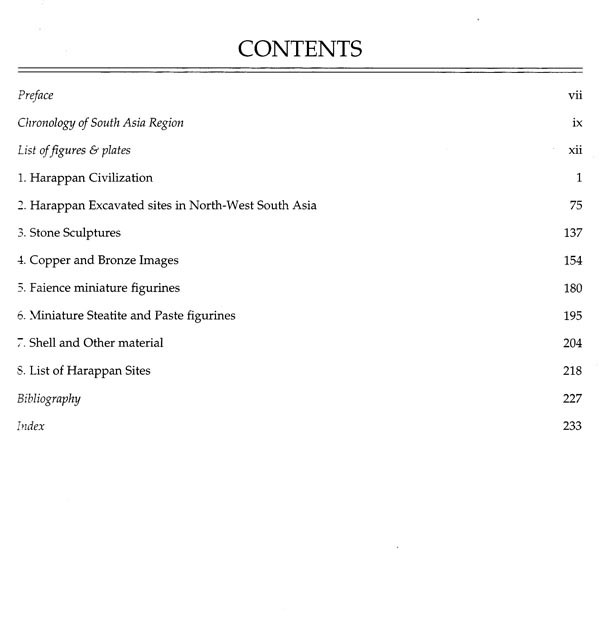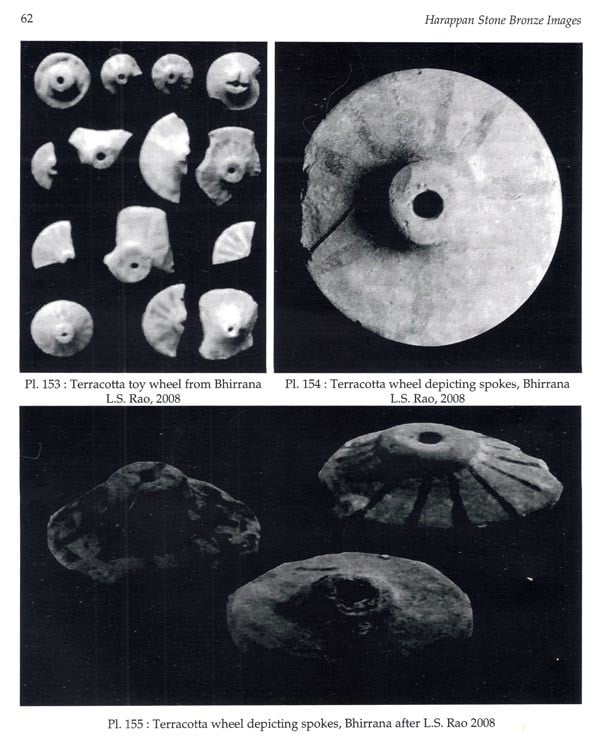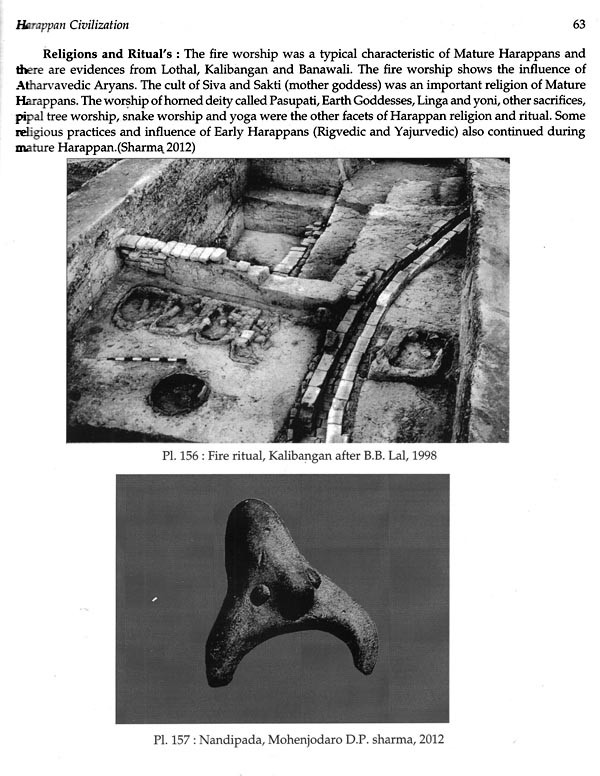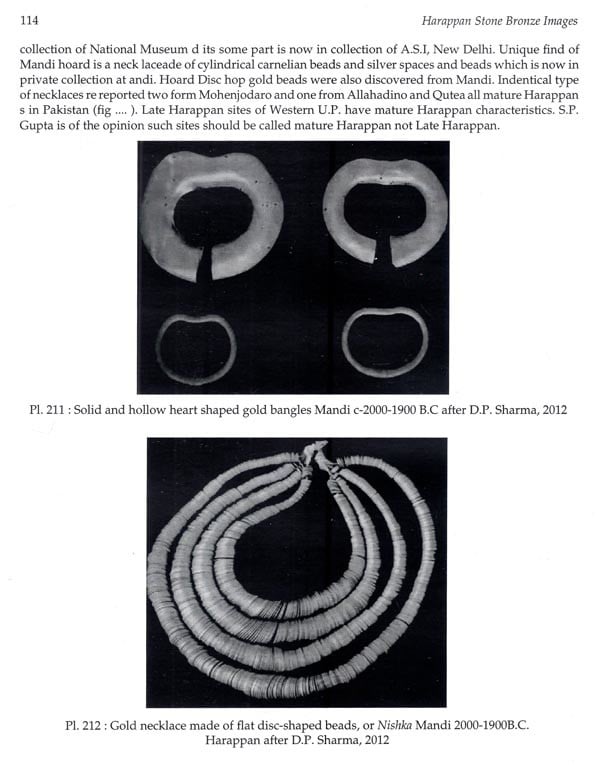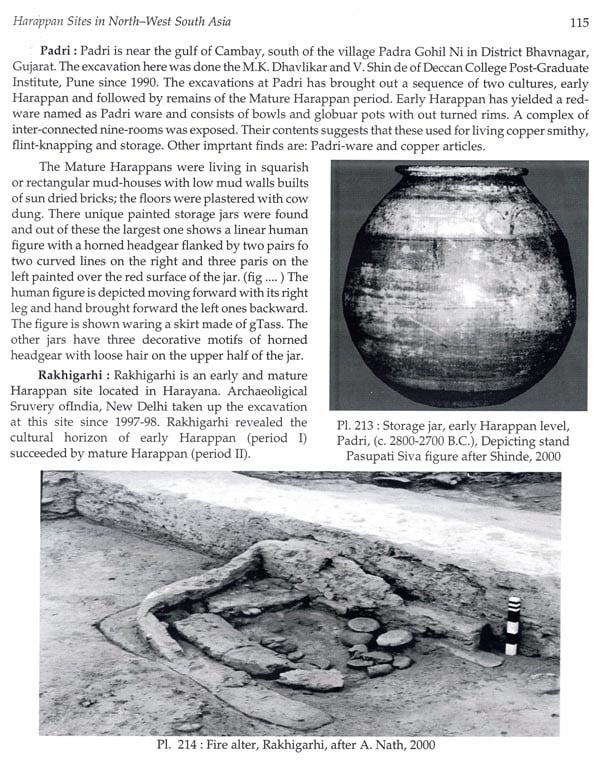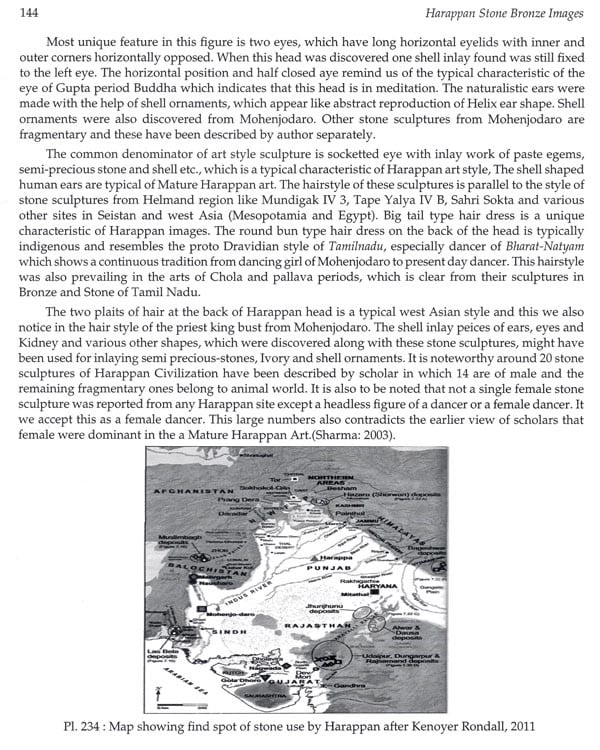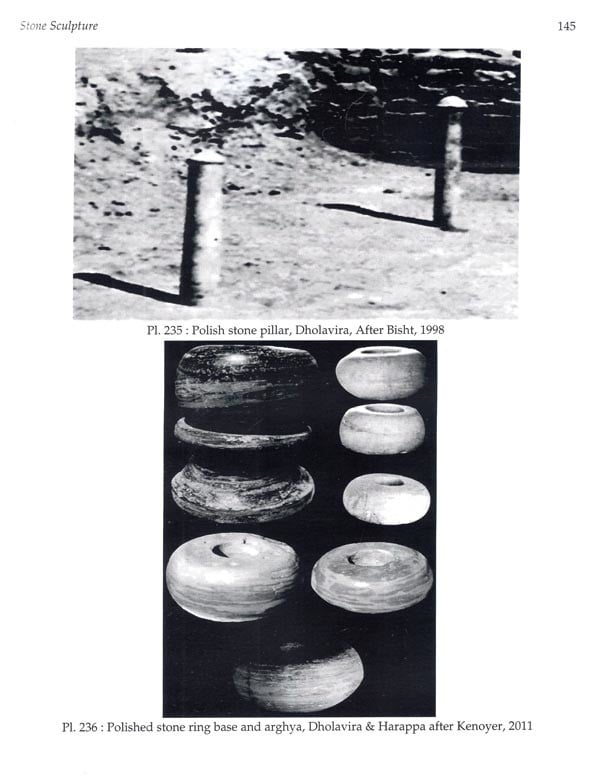About the Book The present book The Harappan. stone and Bronze Images covers Stone, Bronze, Faience & Steatite images. Harappan Civilization was Contemporary of Mesopotamian, and Egyptian civilization Harappan traders were having their colony at Ur and kish in Mesopotamia and they were having long distance trade. Art historian like Chudamani Nandgopal named Harappan Art as Industrial Art however this term is most appropriate. for Seals, Shell, Jewellery, Ivory, capper etc. We cannot call stone. Bronze and terracotta figurines as Industrial art. These are basic decorative item of Harappan civilization. According to Author and. Jaya Menon most appreciate term for these object is Minor Arts Crafts of Harappan. civilization. This book is documentation work of Harappan' The Harappan stone and Bronze images which includes collection, mostly of India and Pakistan. There are eight chapters in this book. The first chapter is on Harappan civilization according to author it hardly matters if we name. This civilization Harappan or Indus Saraswati civilization its meaning is same. The Harappan stone Art is not monumental. The famous stone bust of a bearded man clad in embroidered shawl with trefoil motif from Mohenjo-Daro and. similar headless priest from Dholavira male torso and dancer from Harappa are unique example of stone art. Fourth chapter details. description on copper and bronze figurine. Most beautiful are two dancing girl and Buffaloes from Mohenjo-Daro and Bull from Kalibangan all made in Bronze. Fifth chapter is on Harappan Faience figurines. Six chapter is on Miniature Steatite and Paste Figurines. Seventh chapter is on Shell aid Other Material and eight chapters is n list of Harappan sites. In last there is Harappan Bibliography.
About the Author D DR. Sharma is an Archaeologist. Musologet and Art Historian. He did his MA in Ancient Indian History Culture & Archaeology form Allahabad University and Dphil research on Art and Architecture of Lover Clanga-Yamuna Doab Region from University of Allahabad From 1980 to 1985 he was working as Antiquities Registering officer at Allahabad and Varanast Regions During 1983-84 he was awarded commonwealth scholarship and he qualified M.A. Archaeology from the Institute of Archaeology University of London. He did excavation at Sussex (UK) and Pincenvent (Prance) under Dr. Mark Newcomer and Prof. Gourhan. During 2003-04. He did excavation at Sterkfontein cave in South Africa, under RJ. clark, Where 3.3 M. old Australopithecus skelton was discovered. Since 1 1985-2005 he had been working as head of Harappan and prehistoric collection of National Museum, New Delhi. In 2005 become Associate Professor & H.O.D. Musicology in National Museum Institute (Deemed University).Dr. Sharma has published 220 Papers and 71 Books in which few new are given below: Early Harappan and Indus Saraswati Civilization Vol. I & II, Harappan Art, Prehistoric Art and Archaeology Vol. 1, Gupta Classical Art, Mauryan Art, Harappan Minor Art & Crafts, Harappan Jewellery, Harappan Terracotta, Harappan Seals, Harappan Potteries, Garunda in Asian Art, Copper Hoard Weapons of South Asia, Harappan Script on its way to Decipherment, Harappan Science & Metal Technology, Archaeology of Lower Doab, Vol. I & II, Lost Saraswati Civilization, Bharat Ka Puratattva (Hindi) and Roots of South sian Art. He was working As Director in harat Kala Bhavan Museum of Banaras Hindu University, at present he is visiting Professor Archaeology in Amity University Noida & various Other Gniversity in India, Archaeological Department and other Institutions. At present he is working on research project on roots of symbol in Sindhu Saraswati Civilization.
Preface Dharing the third millennium BC (Circe D700-2000) BLC) highly developed civilization known as Harappan Civilization, exited along the rivers Indus and lost Serawat and Western Uttar Pradesh, all loted in north Western part of South Asia. The area covered 2 million km by the Harappan Civilization extruded from Stander on the Makran com situated on the border of Iran and Pakistan, to Alamgirpur ard Hulas, Mandi and Shamlinagar, Singauti, Nahcul and Topal (near greater Noida) all on the Hind river in western Uttar Pradesh, and Shurtaghai (Afghanistan) in the north to Daimabad in western Maharashtra Late Harappen sites in Delhi are Bhorgarh, Mandauli, Dhansa and Karkari-Nahar The Early Harappen first made their settlement around circa 3500 BC in Mehrgarh Baluchistan. Later on they shifted to Harappa and Mohenjo-Daro and developed themselves further and became Mature Harappan. New cavation done at Bhirran shows origin and roots of pre early Harappan around 6000 5000 BC TC mother goddess figurine dated 6000 BC shown resemblance with figurines of Mehrgarh period IC & TL date of Bhirrano are going back to late 7th to 6th Miserliness BC On the basis of calibrated radiocarbon dates the age for the Mature Harappan Civilization ranges to circa 2700-2000 B.C The pattern of this civilization in certain respects was uniform as is evidenced not only from the seals, sealing, writings, beads, weights and measures, pottery etc, but also from the bricks and brick-laying technique &e settlement pattern which are the same. The linear measuring scale has been found at Lothal, Kalibangan, Mohenjo-Daro and Allahdino all Mature Harappan sites. The flat-bottomed boats were used for transport in rivers and lakes. Harappan Civilization ended due to Massive flooding, climatic changes and increase of aridity, tectonic movements and decline of trade with West Asia. Till today Author had written 42 books on different aspect of Harappan civilization. The present book Harappan Harappan stone, Bronze Images covers Stone, Bronze, Faience & Steatite images B.B. Lal, S.R. Rao. M.J. Kenoyer, G.L. Poschl, DP. Agarwal, Vasant Shinde, R.S. Bhist, Raja Ram, M.K. Dhavalikar, JP. Joshi, K.N. Dikshit, VN. Sanavane, 5.P. Gupta, Naynjot Lahiri, Robert Knox, Madhubala, Amrendranath, Kadambini, Sashi Asthana, A.K. Sharma, J. Nath Madhuri Sharma are doing lot in this direction and late have published several papers books on Harappan Archaeology. Harappan Civilization was Contemporary of Mesopotamian and Egypt and Harappan traders were having their colony at Mesopotamia and they were having long distance trade with Harappan. Some Art historian named Harappan Art as Industria Art, however this term is most appropriate for Seals, Shell Jewellery, Ivory, etc. We cannot call stone Bronze and terracotta figurines as Industrial art these are basic decorative item of Harappan. Accordim Authors and Jaya Menon most appropriate term for these is Minor Arts Crafts of Harappan civilization.
The present book Harappan minor Art and Craft is in Five volumes. This Volume I covers stor onze miniature figurines, Volume II is on Terracotta, Volume III is on seals, Volume IV is on Harapp wwellery, Volume Fifth is on Covers, Minor Crafts which includes ceramics, copper and others mater s book is documentation work of Harappan minor Art and crafts which are mostly in India and Pakis udes complete documentation of minor art and Crafts of Harappan age objects in National muses of New Delhi Collections.
**Contents and Sample Pages**

